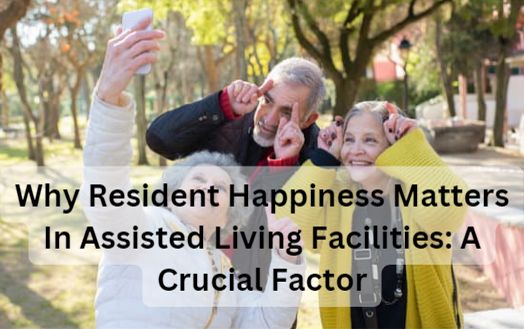Resident happiness is a crucial aspect of assisted living facilities, as it directly impacts the overall well-being, health, and quality of life for seniors. In these communities, residents have the opportunity to socialize, engage in various activities, and live a fulfilling life with the support of trained professionals, fostering a sense of belonging and contentment.
There are numerous factors contributing to the importance of resident happiness in assisted living facilities. These factors include physical and emotional health, social connections, and personal autonomy, all of which play a vital role in shaping the experience of seniors in their new living environment.
Understanding why resident happiness is essential in assisted living facilities not only benefits the seniors themselves, but also allows facility operators and caregivers to create an environment in which residents can thrive and make the most of their golden years. In this article, you will know why resident happiness matters in assisted living facilities.
Importance of Resident Happiness
Resident happiness is a crucial aspect to consider in assisted living facilities, as it directly influences various aspects of seniors’ lives, including physical health, emotional well-being, and social connections.
Physical Health Benefits
A happy and content resident is more likely to engage in regular physical activity and participate in other health-promoting behaviors. A positive emotional state can help reduce stress and lower the risk of developing chronic conditions like heart disease, diabetes, and hypertension. Furthermore, studies have found that maintaining a sense of happiness can lead to seniors feeling healthier overall.
Emotional Well-being
Happiness plays an essential role in maintaining the emotional well-being of residents in assisted living facilities. Feeling valued, respected, and supported by staff and fellow residents can improve one’s mood, foster resilience, and enhance one’s overall sense of happiness. A positive living environment also reduces the risk of anxiety and depression, which are common challenges faced by older adults.
Social Connections
As seniors transition into assisted living communities, maintaining and forming new social connections is vital to their happiness. Senior living communities that provide opportunities for friendship, shared activities, and social engagement help promote resident satisfaction and contentment. A strong social network can not only alleviate feelings of loneliness but also contribute to a sense of belonging and purpose, further cultivating overall happiness.
Key Factors Influencing Happiness in Assisted Living

Quality Of Care
A critical component of resident happiness in assisted living facilities is the quality of care provided. High-quality care includes the medical support, personal assistance, and emotional support residents receive from staff members. The level of care received has a significant impact on residents’ physical and emotional well-being, which in turn affects their overall happiness. This is one of the main reasons why resident happiness matters in assisted living facilities.
Environment And Amenities
The environment in which residents live is another essential factor in their happiness. A comfortable, clean, and attractive setting can contribute to a positive living experience. Access to various amenities such as well-designed common areas, private residences, and outdoor spaces allows residents to feel more at home and enjoy a higher quality of life. Furthermore, the provision of essential services, such as housekeeping and access to healthy meals, plays a significant role in residents’ satisfaction.
Activities And Engagement
Engaging in activities and socializing with others is vital for residents’ mental health and happiness. Assisted living facilities should offer a variety of activities and programs that cater to diverse interests and abilities, allowing residents to stay engaged and maintain social connections. Participation in these activities has been shown to have positive effects on happiness and overall mental well-being among older adults.
Autonomy And Independence
Ensuring residents have the ability to maintain their sense of autonomy and independence is integral to their happiness in assisted living communities. This includes allowing them to make choices related to their daily routines, personal preferences, and care plans. According to a study, nursing home residents felt happier and more satisfied with their lives when they were empowered to make decisions about their care and daily routines.
Best Practices To Improve Resident Happiness

Personalized Care Plans
One essential approach to promote resident happiness in assisted living facilities is to develop and implement personalized care plans. These individualized plans should consider the unique needs, preferences, and goals of each resident, as well as their long-term health and well-being. By delivering care tailored to each person’s uniqueness, you foster a sense of dignity, independence, and satisfaction for residents.
Staff Training And Support
Providing adequate staff training and support is crucial for maintaining a high quality of care in assisted living facilities. Regular training sessions keep staff updated on best practices, effective communication techniques, and the latest industry standards. Furthermore, supporting staff with resources that enable them to manage their workload and maintain a positive work environment enhances their level of job satisfaction, which in turn, positively impacts the happiness of residents.
Family Involvement
Encouraging family involvement is another valuable method for improving resident happiness. Fostering open communication and collaboration between staff, residents, and their families helps establish a supportive community. Regular updates on resident progress, scheduled visits, and opportunities for family members to actively participate in care plans ensure a strong emotional bond between residents and their loved ones, boosting the overall happiness and well-being of assisted living facility residents.
Continuous Improvement
Lastly, a commitment to continuous improvement is essential for enhancing resident happiness. This involves regularly evaluating and assessing care processes, facility policies, and overall staff performance. Soliciting feedback from residents and their families can help identify areas for improvement and promote a more responsive, resident-centered approach. By constantly striving to improve the quality of care and resident experience, assisted living facilities can create a positive, fulfilling environment that promotes happiness and well-being.
Conclusion
In assisted living facilities, resident happiness plays a crucial role in the well-being and overall quality of life for older adults. A positive atmosphere has been shown to improve life satisfaction and reduce depression among residents. By focusing on the needs and desires of the individuals, facilities can create a more engaging and comfortable environment.
Furthermore, fostering strong relationships between direct care workers and residents can significantly impact the residents’ overall experience and well-being. When staff are committed to understanding and addressing the unique needs of each resident, it leads to a more satisfying and homelike atmosphere.
Considering the importance of creating a sense of home for individuals in residential care, it is essential for facilities to prioritize resident happiness. This includes offering a range of activities, engaging with residents in meaningful ways, and maintaining a supportive and compassionate environment.
Last but not least, staff members’ well-being cannot be overlooked. A healthy and happy team is more likely to provide optimal care and create a positive atmosphere for the residents. Therefore, investing in staff development, support, and morale can greatly contribute to resident happiness in assisted living facilities. It is important to know why resident happiness matters in assisted living facilities in order to provide quality care and service to our elderly and disabled loved ones.

